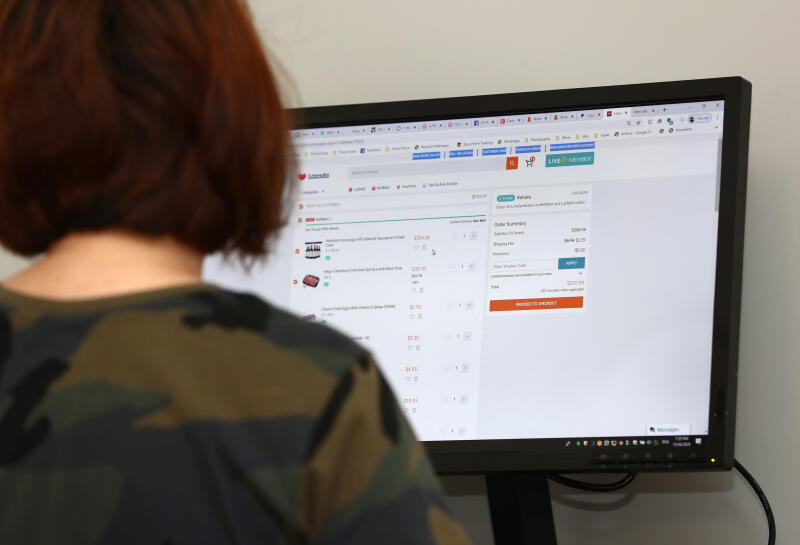More people go cashless, e-payment volume soars amid Covid-19 crisis
Sign up now: Get ST's newsletters delivered to your inbox

The volume of cashless transactions nearly doubled in the first three months of this year compared with the same period last year.
ST PHOTO: BENJAMIN SEETOR
SINGAPORE - The Covid-19 outbreak has drastically accelerated Singapore's shift to a cashless world, with unprecedented growth in the number of e-payment transactions matched by a sharp decrease in cash withdrawals and deposits.
Not only are more people are buying necessities using grocery and food delivery apps and paying for them using cards, but they are also paying for goods without using cash over-the-counter at supermarkets and eateries.
Singapore's largest bank DBS said that the volume of cashless transactions nearly doubled in the first three months of this year compared with the same period last year.
Meanwhile, the volume of cash withdrawals and deposits by its customers fell by an unprecedented 11 per cent during the three months compared with the year-ago period. The rate of decline in cash transactions has always hovered at 5 per cent yearly since 2017.
"The Covid-19 crisis has been difficult for everyone but one positive is that it has served as a catalyst for change (to cashless), with consumers now having to adapt to not being able to go out," said DBS head of consumer banking group (Singapore) Jeremy Soo.
"In the first three months of the year, we have seen 100,000 customers start online spending for the first time. These are people who have realised there's another way to do it if they want to avoid a lot of inconvenience."
About 30 per cent of these customers are above the age of 50, as cashless transactions for both online groceries and online food deliveries increased by between 30 to 40 per cent.
It was a similar story with United Overseas Bank and OCBC customers.
UOB group retail head of mobile and digital Aaron Chiew said online grocery shopping using its cards grew by 44 per cent in the first three months of this year compared with the same period a year ago.
Similarly, online food orders and e-commerce transaction volume grew yearly by 41 per cent and 36 per cent, respectively, during the same period, he added.
For OCBC, customer spending increased by up to 50 per cent on food deliveries as well as on online video and music streaming subscription services such as Netflix and Spotify.
Online grocery spending has doubled, although overall online consumer spending has fallen by about 10 per cent, said OCBC head of cards Vincent Tan.
"The Covid-19 outbreak has impacted spending on travel and airlines, which typically have higher average transaction values," he added.
Graduate student Cleo Tay, 26, said she has been buying items online that she either cannot go out and buy, or needs for working from home, such as food.
"I also bought a wire mesh for the front gate so my two cats can't get out. I have been leaving the door open for better ventilation when I'm working," said Ms Tay, who used e-wallets such as DBS PayLah and GrabPay and her POSB debit card.
Strict stay-home measures implemented to curb the spread of Covid-19 have also significantly reduced footfall at banks' physical branches and compelled many to reduce their reliance on cash. DBS said footfall has fallen by 50 per cent, while UOB has closed a third of its branches for the duration of the circuit breaker period.
Beyond cash deposits and withdrawals falling, the number of PayNow transactions has also nearly doubled for both OCBC and DBS customers during the first three months of this year compared with last year. PayNow is a mapping service which lets users transfer money to others instantly by keying in the recipient's mobile phone or identity card number.
DBS' Mr Soo said he does not see customers returning to old modes of spending and banking even when life returns to normal.
"I look at it this way - if the consumer experience is safe, fast and good, there's no reason why the user will ditch it and go back to something that is not as seamless," he said.


